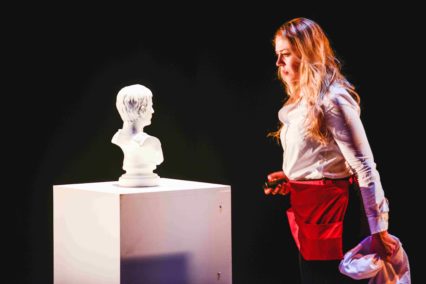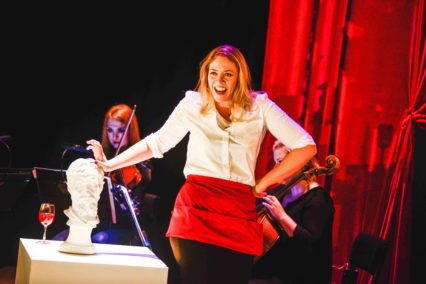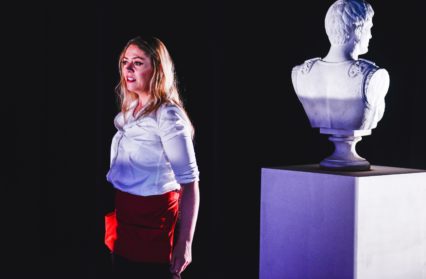A Digital Chamber Opera by Tom Green and Carol Ann Duffy
Amanda Forbes, soprano
The Mavron Quartet
Directed by Ed Madden
Welsh National Opera, Echo Forest, Taliesin Arts Centre and Mavron Quartet co-production
Weston Studio, Wales Millennium Centre, Cardiff, 15th October 2017 (premiere)
Those queuing up to go into the Weston Studio did not look like your average opera audience. The premiere of The World’s Wife attracted a diverse crowd, no doubt including those who enjoy chamber music, particularly admirers of the Cardiff-based Mavron Quartet and people who have been impressed in the past by soprano Amanda Forbes as a performer of new music. And there was another group, only partially overlapping with the others: lovers of the poetry of Britain’s Poet Laureate, Carol Ann Duffy. The combination of these attractions promised much and delivered even more.
The initial impetus for The World’s Wife came from the Mavron Quartet, who after a previous collaboration with composer Tom Green, asked him for a work of about an hour’s length. Green, who describes poetry as central to his work, introduced Duffy to the collaboration. At an illuminating pre-performance event, Duffy read some of the poems from her collection The World’s Wife (1999) which Green has set in the opera, and he described his approach to its composition, drawing on the work of under-celebrated female composers, notably the 17th century Venetian Barbara Strozzi.

Denied access to both the opera house and the church because of her gender, Strozzi published her own music. Whether or not she also sold her body as is claimed by some, she sold more cantatas than any other composer in Europe during her lifetime, but her reputation died with her, to be revived only in recent decades. Green has reworked musical material from Strozzi’s aria ‘Amor dormiglione’ in his setting of Duffy’s poem ‘Salome’, cabaret-style. There’s a neat textual counterpoint here as Strozzi’s singer urges her ‘big sleepyhead’ to wake up, while Salome’s view of and attitude to the head on her pillow is rather different!
Green’s music is eclectic. Queen Herod opens with the quartet playing chords from Clara Schumann which dissolve within the space of a minute into contemporary musical language. He also uses a phrase from Clara Schumann in Anne Hathaway, adding a beat to the bar to give it a baroque dance feel. Elsewhere motifs are mixed in from composers ranging from Hildegard von Bingen to Elizabeth Lutyens. But, very importantly, Green told us that before any of this he looked for the music in the words, rhymes and rhythms of Duffy’s poems.
The opera brings out so much music from the poems. As the singer walks through the gallery-like set, in which classical plaster busts of Shakespeare and other men sit on low plinths, she begins the setting of the first poem, ‘Little Red Cap’, unaccompanied and on a single note, in the style of a recitative. Amanda Forbes is mesmerising from the start, pure of tone and clear of diction. Upstage the players of the quartet wait until it is time for Christiana Mavron on first violin to join in the song.
In ‘Pilate’s Wife’ Rachael Elliot on second violin joins the texture but Niamh Aston (viola) and Beatrice Newman (cello) do not pick up their instruments yet, instead adding percussive texture and tension to the drama with rhythmic clapping.

Forbes commands the stage, using her voice in many different ways – speech, laughter, extended vocal techniques, whispering – and throughout communicating the meaning of the words of Duffy’s poems. There is plenty of laughter as well as intensity, for Duffy’s poetry is nothing if not down to earth, not to say frank, about the shortcomings of men. Forbes sashays her way through eleven different characterisations – amongst which special mention must go to the fearsome Mrs Beast – with apparent ease and conviction while the strings are by turns elegiac and skittish. There are, however, no stereotypes here – Green’s music and the superb performances of the singer and string players convey magnificently the nuances of Duffy’s poetry.
As well as his five live performers, Green uses live loop pedals to overlay and enhance their sounds, but he does not bludgeon his listeners with electronic complexity for the sake of it. In the earlier sections of the opera he and Director Ed Madden use looping quite sparingly – here to provide a thunder, there to suggest a gossiping crowd in the background. Where it comes into its own is towards the end of the piece, when key phrases from the different characters play back, overlay one another and form the entirety of The World’s Wife, that is to say her archetype, the very stuff of myth and legend.
The piece concludes with Demeter, surely about the eternal possibility of optimism against all odds as the impossible miracle of spring returns, and rendered in a way which was no less than sublime, Amanda Forbes’s singing haloed over and over by the spiralling loop of her own recorded voice.
Both poet and composer are concerned with redressing the balance, bringing women’s versions of things to the fore. Green is acutely aware of the questions that may well arise about his presence, as a man, in this arena, and all the more so as he states quite specifically that he has composed a piece “only using material from past female composers.”*He poses the question himself “Am I just another’s man stealing women’s work for glory?”* Does his self-awareness redeem him? It certainly goes some way towards doing so, and if Carol Ann Duffy is happy to work with him who is anyone else to argue with her?
For myself, I think that The World’s Wife is a wonderful addition to the canon of contemporary chamber opera and that audiences in Wales are privileged to have the opportunity to see and hear it performed by such fine musicians.
* From programme notes for The World’s Wife
Details of further performances of The World’s Wife on a tour of Wales are here.
Cath Barton, a regular contributor to Wales Arts Review, is an English writer who lives in Wales. She won the New Welsh Writing AmeriCymru Prize for the Novella for The Plankton Collector, which will be published in 2018 by New Welsh Review under their Rarebyte imprint.
Header image credit Kirsten McTernan



 Enjoyed this article? Support our writers directly by buying them a coffee and clicking this link.
Enjoyed this article? Support our writers directly by buying them a coffee and clicking this link.







